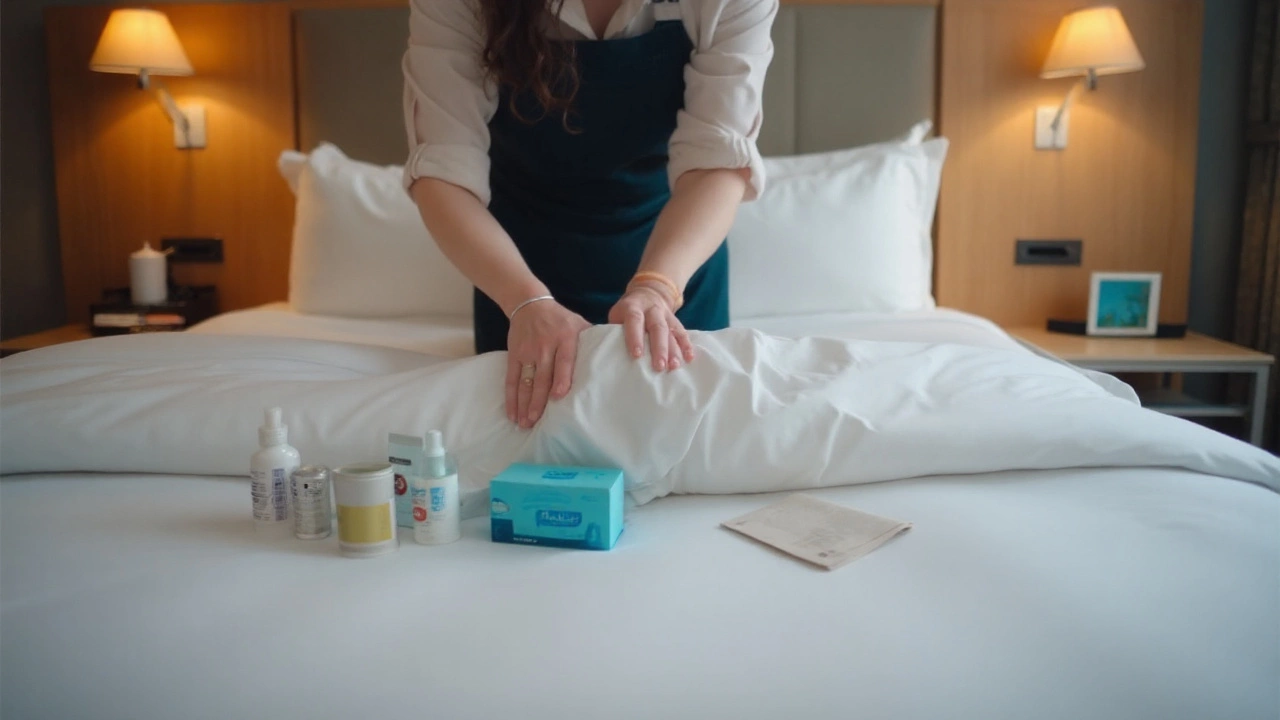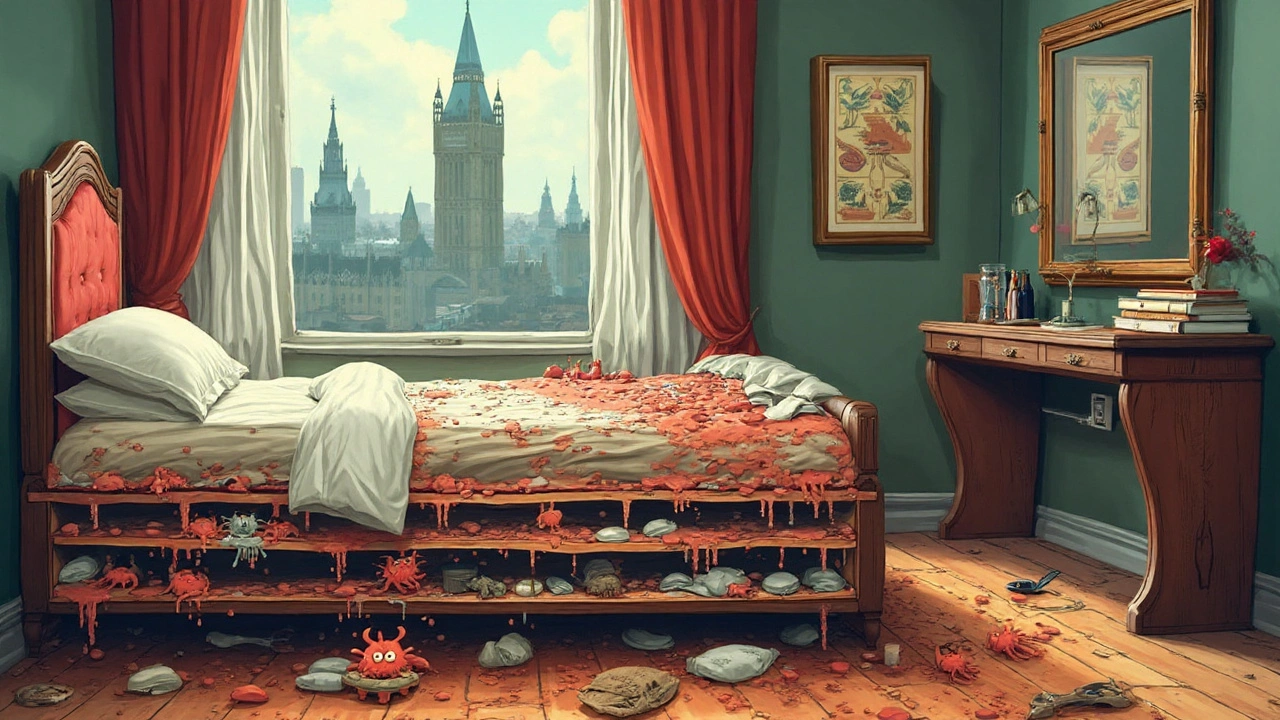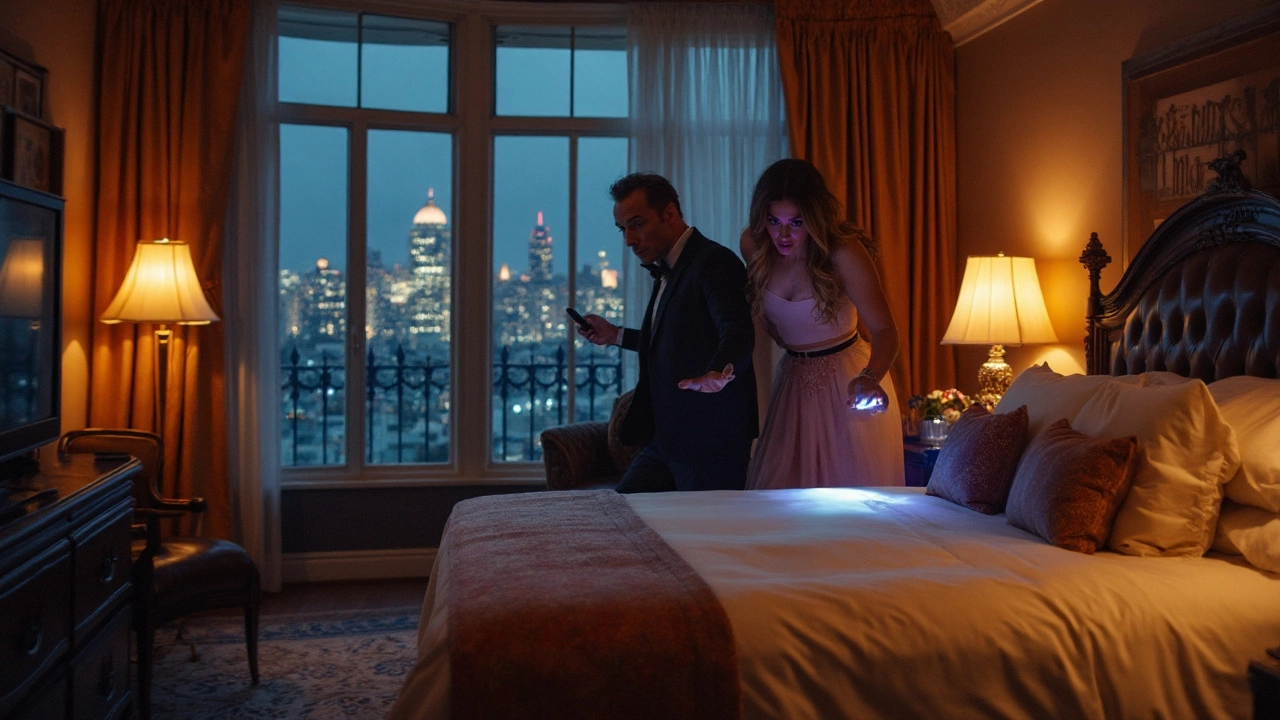Just about everyone’s heard the stories—hotel rooms are cleaned with lightning speed, sheets swapped only when they have to be, and the remote control? Well, that’s apparently a germ magnet. The crazy thing is, despite knowing all this, hundreds of thousands still choose to get intimate in hotels every single night. So, how worried should you actually be? Let’s talk about what’s really going on behind closed hotel doors, how safe it is to get frisky, and what you can do to cut the risks. Spoiler: don’t trust the mug on your bedside table—unless you want to play germ roulette.
How Clean Are Hotel Rooms, Really?
If you think hotel rooms are spotless just because everything looks fresh, you might want to pump the brakes. There was this wild study by ABC News that found hotel workers used the same cleaning cloth on the sink, glassware, and the bloody toilet. Not great. Some hotels hit the standards, but others cut corners. In high-turnover chains, especially during busy seasons, housekeepers usually have about 25 minutes per room, tops. That means changing obvious stuff (sheets, towels), wiping visible marks, and fluffing pillows at light speed. Deep cleaning, like scrubbing remotes, switches, or that armchair? Rare.
Where are the worst offenders? Studies keep nailing the same hot spots: TV remotes, light switches, bedside tables, headboards, and—wait for it—the bedspread. Apparently, loads of hotels swap out the sheets but leave the bedspreads for weeks, sometimes even months. If the place is a bit sketchy, odds that any surface is properly sanitized drop fast. Fancy hotels are a little better, but they’re not immune. Even some 5-star hotels get lazy, especially when they’re cranking through a full house. If you’re paranoid, bring a portable blacklight (they’re cheap!) and inspect before you drop your suitcase on the bed. The stains you’ll find—even in surprisingly posh spots—would kill the mood instantly for most folks.
Then there’s those glasses on the nightstand. Investigation footage, including a report by Inside Edition, once caught cleaning staff rinsing them with just water, even sometimes wiping them out with a hand towel that was just used for cleaning the toilet. Not exactly five-star treatment. Touchpoints like the mini fridge handle, sink faucet, and door knobs rarely get more than a passing wipe—if that. No wonder a microbiology study out of the University of Houston found hotel rooms can house as much bacteria as a dorm room after exam week.
Let’s not lie, it’s hard to know what you’re stepping into. Guest turnover means all kinds of people, all kinds of behaviors. Sometimes it’s just a harmless couple’s getaway, but sometimes you’re literally lying where three other strangers have gotten busy in the last 48 hours. It’s not about being a neat freak; it’s about basic hygiene.

Real Risks of Getting Intimate in Hotels
So, what are you actually risking, health-wise, if you get busy in a hotel room? Actual disease transmission from surfaces is pretty low if you keep your clothes and linens in check. But hotel rooms can easily play host to a cast of usual suspects: norovirus, E. coli, staph, and occasionally MRSA (that’s the antibiotic-resistant kind of staph). Most people don’t catch anything just by lying down, but all bets are off if things get hands-on—like when you touch a filthy TV remote and then… well, you get the idea.
Research from the University of Arizona showed that things like bedspreads and decorative pillows (yep, those fancy little cushions) can have more bacteria per square inch than the seat on a city bus. Think about it: those never get laundered, and everyone’s had their hands (and probably feet) all over them. Make direct skin contact during, let’s say, spirited activity, and you might expose yourself to bacteria or fungi. The risk shoots up for stuff like athlete’s foot, rashes, or less frequently, cold sores and even the flu—especially if you’re rubbing against contaminated surfaces and then touching your face or mouth. Even basic things, like bad air from dodgy aircon units or moldy corners, can get your allergies roaring or pass on respiratory bugs if you’re unlucky.
What about the risk of sexually transmitted infections (STIs)? That’s entirely up to your partner, not the hotel—so the rules for safe sex stay exactly the same whether you’re home or away. Condoms are still your best friend if you’re not with a long-term partner. Make sure you’re not relying on one that’s been in your wallet for ages because believe it or not, heat and pressure can wreck latex. Each year, people end up at clinics with infections, not from the bed or the room, but from ditching basic precautions during spontaneous hotel adventures.
Want the weirdest fact? Sometimes, lovebug bites aren’t about bacteria at all—it’s bedbugs. These little monsters don’t care if you’re rich, famous, or just having a wild fling on holiday. They infest the fanciest suites and the dodgiest motels. Bedbugs hide in the seams of mattresses, headboards, and even in the carpet. Getting bitten won’t give you a deadly disease, but a cluster of red, itchy welts is nobody’s idea of an afterglow. Hotels in places with a lot of guest turnover are often prime targets, and the bugs are near impossible to spot until you’ve already snuggled up. Yikes.

Smart Tips To Make Hotel Sex Safer and More Pleasant
Okay, you’re not going to swear off hotels forever, but you want to stay healthy and maybe dodge an STD, rash, or a bout of bedbugs. Here’s what actually works:
- Strip the bed as soon as you walk in. Ditch that bedspread and all those fancy throw pillows—the cleanest thing on the bed is usually the fitted sheet underneath. If you’re extra cautious, bring your own sheet or a travel liner.
- Wipe down high-touch surfaces. A travel pack of disinfectant wipes isn’t overkill—use them on remote controls, lamp switches, toilet handles, and any surface you’re likely to touch in the heat of the moment. Don’t forget door and tap handles.
- Glassware? Give it a rinse with hot water and a dab of soap before using. Or just use the sealed paper cups if they’re provided.
- Avoid direct skin contact with carpets and upholstered chairs. Floor cleanliness is about as certain as spotting a kangaroo in London. Use a towel as a barrier if things are going to get frisky anywhere but the bed.
- Check for bedbugs. Lift the corners of the mattress and peek at the seams. Look for tiny black dots or shed skins—if you spot anything suspicious, change rooms. Fast.
- Always pack your own protection—condoms, lubricant, maybe even your own pillowcase if you’re feeling fancy. Relying on “complementary” ones from the minibar is riskier than trusting your uncle’s homemade barbecue.
- Don’t touch your face after fondling mystery objects (like the curtain cord or TV guide), and definitely wash your hands before any touching below the belt.
- Keep your personal belongings off the bed till you’ve had a look around. Suitcases bring their own bacteria—no point mixing things up even more.
If things get, well, passionate enough to muss up the sheets, leave them in a pile for cleaning staff. It sends the message that a room refresh isn’t optional. Respect for the next guest, right?
If hygiene still gives you the icks, upgrade your expectations: brand-name hotels and boutique spots with high star ratings tend to do a better job. Some chains are known for hospital-grade cleaning and even brag about “germ-resistant” bedding or UV treaters (they’re rare and usually expensive, but ask if you’re worried). When booking, check reviews for keywords like “cleanliness,” or browse photos other guests posted. Shabby cleaning gets called out fast these days.
One last thing: if you’re at a love hotel or a motel that rents rooms by the hour, triple everything above. Quick turnover means even less attention to detail, and “clean” is a flexible concept in some places. It might be fun and spontaneous, but be extra cautious with wipes, your own linens, and maybe consider leaving your socks on—just in case.
So, is it safe? Honestly, if you take basic steps, you’re probably fine. Hotel rooms aren’t as sterile as people think, but they’re not toxic warzones either. It’s about being aware, taking a few simple precautions, and focusing more on each other than on what the last guest left behind. Enjoy yourself, stay safe, and don’t forget to wash your hands. It’s the little things that kill the vibe—or save the day.

